Blog Archives
Harold and the Purple Crayon (2024)
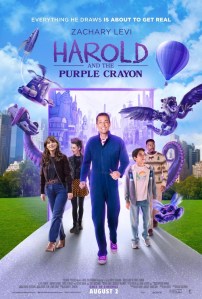 As an elder Millennial, I’ll try and ignore my rising bile for what they did to my boy Harold here, and I’ll simply ask who was this movie for? The big screen adaptation of the classic 1955 children’s book by Crockett Johnson that celebrates the power of imagination is a mishmash of mawkish feel-good family nonsense, fantasy power wish-fulfillment, and grating fish-out-of-water comedic antics. Increasingly missable actor Zachery Levi (Shazam!) plays yet another glorified man-baby, this time as an “adult” Harold who ventures into the Real World to search for his narrator, essentially the god of his purple-hued universe. He befriends a lonely boy with a big imagination and the kid’s single mom (poor Zooey Desceanel) and life lessons are learned while “adult” Harold makes a mess of just about everything as he leaves behind chaos and disaster. Eventually Harold has a full-on wizard duel against a villainous librarian and wannabe published fantasy author played by Jermaine Clement. That’s right, Harold and the Purple Crayon transforms into a magic battle over the fate of the all-powerful ring, I mean crayon. Making matters worse is Levi’s hyperactive schtick that has been growing stale for years and is tiresome and annoying throughout the movie. It’s also quite ironic, and phony, that a movie expressly proclaiming the power of individuality and imagination is so thoroughly and depressingly generic. This should have been animated or left alone, period.
As an elder Millennial, I’ll try and ignore my rising bile for what they did to my boy Harold here, and I’ll simply ask who was this movie for? The big screen adaptation of the classic 1955 children’s book by Crockett Johnson that celebrates the power of imagination is a mishmash of mawkish feel-good family nonsense, fantasy power wish-fulfillment, and grating fish-out-of-water comedic antics. Increasingly missable actor Zachery Levi (Shazam!) plays yet another glorified man-baby, this time as an “adult” Harold who ventures into the Real World to search for his narrator, essentially the god of his purple-hued universe. He befriends a lonely boy with a big imagination and the kid’s single mom (poor Zooey Desceanel) and life lessons are learned while “adult” Harold makes a mess of just about everything as he leaves behind chaos and disaster. Eventually Harold has a full-on wizard duel against a villainous librarian and wannabe published fantasy author played by Jermaine Clement. That’s right, Harold and the Purple Crayon transforms into a magic battle over the fate of the all-powerful ring, I mean crayon. Making matters worse is Levi’s hyperactive schtick that has been growing stale for years and is tiresome and annoying throughout the movie. It’s also quite ironic, and phony, that a movie expressly proclaiming the power of individuality and imagination is so thoroughly and depressingly generic. This should have been animated or left alone, period.
Nate’s Grade: D+
Spider-Man: No Way Home (2021)
 This is going to be a difficult review to write. It’s the third Spider-Man movie in the Tom Holland era, though his sixth Marvel Cinematic Universe (MCU) appearance as the character, that much can be said. The MCU has been teasing a universe of parallel universes for a while now, even famously in 2019’s Far From Home, the previous Spider-Man film, and which No Way Home opens seconds later to deal with its immediate aftermath. The scuttlebutt with this new Spider-Man movie is that it is the most Spider-Man in all senses, bringing past iterations from the original Tobey Maguire run (2002-2007) and the maligned Andrew Garfield reboot (2012-2014). We know villains from each non-MCU Spider-Man film are making special appearances, and there are expectations for plenty more special appearances, so by that notion, writing a film review about a movie built upon surprise inclusions and secret revelations can be daunting to even be readable without giving too much away. I’ll do my best, dear reader. Spider-Man: No Way Home is not the best Spider-Man movie, in the MCU or prior, but it’s a rollicking adventure that will play like catnip for fans of the series, all iterations, and has some of the strongest moments of any web-slinging blockbuster.
This is going to be a difficult review to write. It’s the third Spider-Man movie in the Tom Holland era, though his sixth Marvel Cinematic Universe (MCU) appearance as the character, that much can be said. The MCU has been teasing a universe of parallel universes for a while now, even famously in 2019’s Far From Home, the previous Spider-Man film, and which No Way Home opens seconds later to deal with its immediate aftermath. The scuttlebutt with this new Spider-Man movie is that it is the most Spider-Man in all senses, bringing past iterations from the original Tobey Maguire run (2002-2007) and the maligned Andrew Garfield reboot (2012-2014). We know villains from each non-MCU Spider-Man film are making special appearances, and there are expectations for plenty more special appearances, so by that notion, writing a film review about a movie built upon surprise inclusions and secret revelations can be daunting to even be readable without giving too much away. I’ll do my best, dear reader. Spider-Man: No Way Home is not the best Spider-Man movie, in the MCU or prior, but it’s a rollicking adventure that will play like catnip for fans of the series, all iterations, and has some of the strongest moments of any web-slinging blockbuster.
In the wake of Mysterio framing Spider-Man (Holland) and revealing Peter Parker’s real identity, life has not been kind to your friendly neighborhood Spidey. The public has turned on him and even his best friends are suffering the consequences of their personal relationship. It’s enough that Peter seeks out his old pal, the wizard Doctor Strange (Benedict Cumberbatch), to cast a spell to erase the world’s memory of who Spider-Man really is. The magic spell, naturally, goes wrong, and villains of Spider-Man from other universes begin to appear. These larger-than-life characters are dangerous but also confused; this isn’t their universe, and this isn’t their Peter Parker. Doctor Strange is happy to send them all back to their primary universes, to correct the loose ends of the spell, but Peter doesn’t want to send them all to their fated deaths. He wonders if maybe they can be cured or reformed and if it’s too late to still do the right thing.
 First things first, you need to know that this movie is going to play much, much better if you are familiar with, and especially if you’re a fan of, the previous Spider-Man movies. No Way Home almost feels like it was written by a fan who has been nurturing a desire to do right by all past Spider-Man films. This feels like someone who had assembled a list of unresolved issues from different Spider-Man movies for over twenty years and said, “Hey, could I write these characters another ending that can redeem them and provide better closure in a way that is meaningful?” Because of that, each new character that comes through has a definite jolt of fan excitement like an all-star reunion, especially for characters you never thought you would see again. Certainly, some characters have more meaning than others, but I was pleasantly surprised how well integrated and written so many of the villains come across. Returning screenwriters Erik Sommers and Chris McKenna have ret-conned and redeemed the various Spider-Man missteps of old and have given characters more attention and fitting resolution, which makes this a surprisingly emotionally deep Spider-Man in ways you weren’t expecting. There are character reunions and resolutions that I didn’t know I needed, and I was smiling and even battling back tears of my own at various points. If you’re a fan of the recent Holland run, then the movie will still play well, but if you’ve been with Spider-Man from his cinematic beginning (if you really want to feel old, the original Spider-Man teaser involved the World Trade Center) then this movie will feel like a nostalgic blanket to warm you all over.
First things first, you need to know that this movie is going to play much, much better if you are familiar with, and especially if you’re a fan of, the previous Spider-Man movies. No Way Home almost feels like it was written by a fan who has been nurturing a desire to do right by all past Spider-Man films. This feels like someone who had assembled a list of unresolved issues from different Spider-Man movies for over twenty years and said, “Hey, could I write these characters another ending that can redeem them and provide better closure in a way that is meaningful?” Because of that, each new character that comes through has a definite jolt of fan excitement like an all-star reunion, especially for characters you never thought you would see again. Certainly, some characters have more meaning than others, but I was pleasantly surprised how well integrated and written so many of the villains come across. Returning screenwriters Erik Sommers and Chris McKenna have ret-conned and redeemed the various Spider-Man missteps of old and have given characters more attention and fitting resolution, which makes this a surprisingly emotionally deep Spider-Man in ways you weren’t expecting. There are character reunions and resolutions that I didn’t know I needed, and I was smiling and even battling back tears of my own at various points. If you’re a fan of the recent Holland run, then the movie will still play well, but if you’ve been with Spider-Man from his cinematic beginning (if you really want to feel old, the original Spider-Man teaser involved the World Trade Center) then this movie will feel like a nostalgic blanket to warm you all over.
I think it’s safe to discuss some of the villains that have been prominent in the advertisement and later trailers, but if you wish to skip any character details, then skip to the next paragraph. It shouldn’t be much of a surprise that the two biggest villains are the ones with the biggest screen time and most allowance at redemption. Willem Dafoe as Norman Osborne (Green Goblin) and Alfred Molina as Doctor Octavius (Doc Ock) are treasures. It’s so good to see them again in these roles and each actor is just as good as you recall from their time 15-plus years ago. I was worried that bringing Doc Ock back could spoil the redemptive turn he has at the end of 2004’s Spider-Man 2, sacrificing himself to save the day from his own dangerous experiment. Little did I know that the entire movie was going to seek redemptive arcs for a veritable Sinister Six-worth of Spider-Man villains. It becomes the backbone of the movie, and I was skeptical at first but the movie found ways to win me over with just about every character’s inclusion. Norman and Octavius are similar in that they are battling other sinister personas in their heads, and when the real versions of each man break through, it’s often in heartbreaking moments of existential confusion and sadness. This is a movie that has time to fit in Spider-Man memes as well as question the moral culpability. It’s fascinating that a huge Marvel movie is so concerned with providing glimpses of humanity and compassion to bad guys from movies that the general public didn’t even generally like.
 This is the best acting of Holland’s Spider-Man run. He really gets put through the wringer about the consequences of trying to make the moral choice, both good and bad. His most emotional moments got me each time because of the investment in his character growth over six movies as well as the added investment in the supporting characters too. This is the most integrated and important both Ned (Jacob Batalon) and MJ (Zendaya) have been to the plot, and they have a platonic hug at the end that sent me into a tailspin of emotions for what it meant. The humor and natural camaraderie of the actors is still there, a hallmark of the MCU Spider-Man series. I laughed plenty, especially with certain characters deconstructing their parallels and connections (“Gotta watch where you fall,” a villainous understatement). However, this is the most emotional Spider-Man likely ever, and the actors all perform ably. I want to single out Marissa Tomei as Aunt May because she’s been undervalued in these movies until now. This is the biggest role Aunt May has played and she serves as the voice of morality to push Peter to do what he knows is right even in the face of outlandish adversity and personal cost.
This is the best acting of Holland’s Spider-Man run. He really gets put through the wringer about the consequences of trying to make the moral choice, both good and bad. His most emotional moments got me each time because of the investment in his character growth over six movies as well as the added investment in the supporting characters too. This is the most integrated and important both Ned (Jacob Batalon) and MJ (Zendaya) have been to the plot, and they have a platonic hug at the end that sent me into a tailspin of emotions for what it meant. The humor and natural camaraderie of the actors is still there, a hallmark of the MCU Spider-Man series. I laughed plenty, especially with certain characters deconstructing their parallels and connections (“Gotta watch where you fall,” a villainous understatement). However, this is the most emotional Spider-Man likely ever, and the actors all perform ably. I want to single out Marissa Tomei as Aunt May because she’s been undervalued in these movies until now. This is the biggest role Aunt May has played and she serves as the voice of morality to push Peter to do what he knows is right even in the face of outlandish adversity and personal cost.
No Way Home works better thematically than as a well-constructed plot. The solutions to the villain redemption are laughably convenient, and while it’s not as expressly magic as Doctor Strange’s spells, it’s pretty much the equivalent of technological magic. That’s fine, because it’s less the struggle of invention and more the choice that matters for each character. The mechanics of the ending also feel overly convenient and tidy (you could have just done this the whole time?). When Doctor Strange is chastising characters for hasty decision-making, it’s the movie calling attention to its own cheats. The movie splits so much of its time across multiple villains and drafting off of your old feelings. There are other narrative shortcuts taken and abbreviated, especially Strange’s involvement. He’s left out of much of the movie for the same reason Captain Marvel was left out of much of the final battle with Thanos in 2019’s Avengers: Endgame: he’s too powerful to have on the board. I’m not saying the screenwriters made the wrong choices on what to emphasize. The emotional beats of this movie hit strongly, and if they have to rely on a few cheats and nit-picky hand-waves to get there, then so be it.
 From an action standpoint, I think this might rank last for me in the series. Returning director John Watts has never wowed me as an action director. He’s not bad at staging the big moments but he seems more present in zippy tone than in style on a big stage. The added wow factor of seeing the various characters assembled on screen will compensate for much of the action feeling contained to dank sound stages. I think this was done as a cautionary measure to keep the secrets from being leaked, but it also shortchanges the action possibility. There’s nothing in this movie, from a pure action standpoint, that rivals the Venice or London sequences in Far From Home. The movie utilizes portals, and it got my hopes up for clever action inventions, but it serves as more plot device than action complication. There have been some artistic sacrifices, narratively and visually, to accommodate the Spider-Man Movie All-Stars approach, and while I think the filmmakers have emphasized the correct parts, it does still feel like there are some nagging shortcomings to an overall experience that plays exuberantly.
From an action standpoint, I think this might rank last for me in the series. Returning director John Watts has never wowed me as an action director. He’s not bad at staging the big moments but he seems more present in zippy tone than in style on a big stage. The added wow factor of seeing the various characters assembled on screen will compensate for much of the action feeling contained to dank sound stages. I think this was done as a cautionary measure to keep the secrets from being leaked, but it also shortchanges the action possibility. There’s nothing in this movie, from a pure action standpoint, that rivals the Venice or London sequences in Far From Home. The movie utilizes portals, and it got my hopes up for clever action inventions, but it serves as more plot device than action complication. There have been some artistic sacrifices, narratively and visually, to accommodate the Spider-Man Movie All-Stars approach, and while I think the filmmakers have emphasized the correct parts, it does still feel like there are some nagging shortcomings to an overall experience that plays exuberantly.
Finding a comfortable medium between fan service and creative constriction, Spider-Man: No Way Home is not the best Spider-Man movie but at the same time it just might be. It serves as a salve to the rest of the franchise, five iterations across two different runs, and because of that level of attention and compassion, the past movies get a little bit better, with more added resolution, more character moments, and second chances to correct miscues and blunders. Who among us wouldn’t want another opportunity to correct our mistakes? While ostensibly setting up the troubles ahead for the MCU (the trailer for 2022’s Doctor Strange: The Madness of the Multiverse is the final post-credit scene), the movie feels entirely backward-looking, rewarding fans of the character and resolving to do better where other films had gone awry. Maybe (Disney)Fox could do something like this for the bad X-Men movies? I don’t know if the same punitive charges of being slavishly nostalgic will hit No Way Home like they’ve done for the new Ghostbusters and Star Wars. It’s definitely still accessible for newer fans but plays best to the people with the longest investment, but isn’t that every continuing movie series? No Way Home is a rewarding cinematic experience of many highs and fun surprises and cameos as well as a humane redemption for the sins of Spider-Man’s past. It’s not the best superhero movie but it might be the most joyous one yet.
Nate’s Grade: B+
Don’t Let Go (2019)
 It’s a time-displaced mystery where two people, a police detective (David Oyelowo) and his teenage niece (Strom Reid), are trying to communicate across space and time to prevent a personal tragedy, namely the niece’s eventual murder. He’s two weeks ahead time-wise and making use of his advanced knowledge and her insider info to better understand what went wrong that fateful night. If it sounds a bit like 2000’s Frequency, featuring a father and son across the decades with a ham radio, that’s because it’s pretty much Frequency. No matter, this is the high-concept stuff of fun, clever structural gamesmanship, tapping into the past and future to solve a crime. Writer/director Jacob Estes (The Details) has a good first draft but the script needed more work. It starts off rather slow, takes more time than needed to establish its rules, and even after those rules are somewhat hazy, like when Oyelowo gets a download of new memories from his future self. To say the story gets a bit convoluted is an understatement, and the ending feels more like a rush to a finish rather than a carefully planned conclusion. The best asset the movie has is the relationship and performances from its stars. Oyelowo is a man rushed against an impossible task, and his fevered and harried performance does much to communicate the burden placed upon him. Reid (A Wrinkle in Time) is very good as an inquisitive teenager who has to process the looming danger that hangs over her head, plus just being a teen girl in L.A. Both of these actors are at their best when they’re together (via magic phone calls; are texts not magic?) and pushing each other to succeed. There’s great potential in the unlikely partner dynamic with them as well as a resonating personal motivation to drive the movie. I just wish Estes and the filmmakers had slowed things down and given their setup more thought and experimentation. It kind of goes in rather predictable and mundane directions, including having a super killer that seems anything but. Don’t Let Go (a painfully generic title destined to be forgotten) feels like it could have worked a limited run miniseries, or, barring that, a better paced and developed film.
It’s a time-displaced mystery where two people, a police detective (David Oyelowo) and his teenage niece (Strom Reid), are trying to communicate across space and time to prevent a personal tragedy, namely the niece’s eventual murder. He’s two weeks ahead time-wise and making use of his advanced knowledge and her insider info to better understand what went wrong that fateful night. If it sounds a bit like 2000’s Frequency, featuring a father and son across the decades with a ham radio, that’s because it’s pretty much Frequency. No matter, this is the high-concept stuff of fun, clever structural gamesmanship, tapping into the past and future to solve a crime. Writer/director Jacob Estes (The Details) has a good first draft but the script needed more work. It starts off rather slow, takes more time than needed to establish its rules, and even after those rules are somewhat hazy, like when Oyelowo gets a download of new memories from his future self. To say the story gets a bit convoluted is an understatement, and the ending feels more like a rush to a finish rather than a carefully planned conclusion. The best asset the movie has is the relationship and performances from its stars. Oyelowo is a man rushed against an impossible task, and his fevered and harried performance does much to communicate the burden placed upon him. Reid (A Wrinkle in Time) is very good as an inquisitive teenager who has to process the looming danger that hangs over her head, plus just being a teen girl in L.A. Both of these actors are at their best when they’re together (via magic phone calls; are texts not magic?) and pushing each other to succeed. There’s great potential in the unlikely partner dynamic with them as well as a resonating personal motivation to drive the movie. I just wish Estes and the filmmakers had slowed things down and given their setup more thought and experimentation. It kind of goes in rather predictable and mundane directions, including having a super killer that seems anything but. Don’t Let Go (a painfully generic title destined to be forgotten) feels like it could have worked a limited run miniseries, or, barring that, a better paced and developed film.
Nate’s Grade: C+
The Front Runner (2018)
 In 1987, former Colorado senator and governor Gary Hart (Hugh Jackman) was the leading Democrat in primary polling and a sure bet to take on George H.W. Bush for the White House. In three weeks time, his campaign was in tatters and he folded. It all stems from a supposed affair he was conducting with Donna Rice (Sara Paxton). They deny anything but Gary acts like he has something to hide, evading the media’s questions about his marriage and his past history with infidelity. Enough time has passed in the political landscape to take a deeper dive into Gary Hart’s disintegration in the spotlight, and the moment serves a tipping point for changing media coverage. Journalists talk about the “old days” where candidate infidelity and ailments were just ignored as a gentleman’s agreement of sorts between the gatekeepers, but should they have? While a candidate’s martial relations are significantly less important than policy and governance, they do reflect character and what he or she (but, let’s face it, mostly he) acts with authority. Strangely, The Front Runner wants to paint the hungry journalists digging into Hart’s past as the real enemy, going above and beyond the bounds of ethics for crass sensationalism. This is directed and co-written by Jason Reitman (Tully, Up in the Air), a shrewd storyteller with a knack for human drama, which makes the “both sides are bad” equivocation all the more curious. Jackman is strong and has several scenes of righteous speeches talking about how he didn’t sign away his privacy, except when you run for president, you kind of do, and the American public deserve to know if their leaders abuse power. The movie favors long takes with a wide supporting cast of players that speak like they stepped out of an Aaron Sorkin workshop (an exchange celebrating the “integrity” of news anchors wearing bad suits feels ripped right from Sorkin’s unguarded typewriter). The film is nicely sympathetic to the “other woman” in this scenario and treats her like a human being with dimension. The PR recovery and shady deeds of Hart’s team reminded me of the Chappaquiddick, which placed an unfavorable scrutiny on Ted Kennedy and his team of political spin masters after his deadly car accident. It all makes for an entertaining movie with solid performances and interesting character shading, but its perspective is too wobbly, trying to lay the blame on everyone it can find.
In 1987, former Colorado senator and governor Gary Hart (Hugh Jackman) was the leading Democrat in primary polling and a sure bet to take on George H.W. Bush for the White House. In three weeks time, his campaign was in tatters and he folded. It all stems from a supposed affair he was conducting with Donna Rice (Sara Paxton). They deny anything but Gary acts like he has something to hide, evading the media’s questions about his marriage and his past history with infidelity. Enough time has passed in the political landscape to take a deeper dive into Gary Hart’s disintegration in the spotlight, and the moment serves a tipping point for changing media coverage. Journalists talk about the “old days” where candidate infidelity and ailments were just ignored as a gentleman’s agreement of sorts between the gatekeepers, but should they have? While a candidate’s martial relations are significantly less important than policy and governance, they do reflect character and what he or she (but, let’s face it, mostly he) acts with authority. Strangely, The Front Runner wants to paint the hungry journalists digging into Hart’s past as the real enemy, going above and beyond the bounds of ethics for crass sensationalism. This is directed and co-written by Jason Reitman (Tully, Up in the Air), a shrewd storyteller with a knack for human drama, which makes the “both sides are bad” equivocation all the more curious. Jackman is strong and has several scenes of righteous speeches talking about how he didn’t sign away his privacy, except when you run for president, you kind of do, and the American public deserve to know if their leaders abuse power. The movie favors long takes with a wide supporting cast of players that speak like they stepped out of an Aaron Sorkin workshop (an exchange celebrating the “integrity” of news anchors wearing bad suits feels ripped right from Sorkin’s unguarded typewriter). The film is nicely sympathetic to the “other woman” in this scenario and treats her like a human being with dimension. The PR recovery and shady deeds of Hart’s team reminded me of the Chappaquiddick, which placed an unfavorable scrutiny on Ted Kennedy and his team of political spin masters after his deadly car accident. It all makes for an entertaining movie with solid performances and interesting character shading, but its perspective is too wobbly, trying to lay the blame on everyone it can find.
Nate’s Grade: B
Ralph Breaks the Internet (2018)
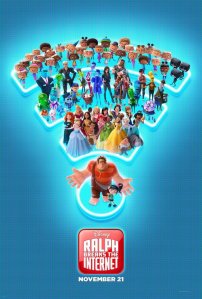 Ralph (voiced by John C. Reilly) and his best pal Vanellope (voiced by Sarah Silverman) must venture out of their arcade home once Vanellope’s game gets broken. She’s in danger of having her racing game shelved for good unless they can find a new steering wheel controller. Thanks to the installation of wi-fi, Ralph and Vanellope hop along the information super highway and visit an online metropolis bursting with life and possibility. It’s a world of advanced games, races, and interactivity and Vanellope might not want to go back to her old world, much to the chagrin of Ralph.
Ralph (voiced by John C. Reilly) and his best pal Vanellope (voiced by Sarah Silverman) must venture out of their arcade home once Vanellope’s game gets broken. She’s in danger of having her racing game shelved for good unless they can find a new steering wheel controller. Thanks to the installation of wi-fi, Ralph and Vanellope hop along the information super highway and visit an online metropolis bursting with life and possibility. It’s a world of advanced games, races, and interactivity and Vanellope might not want to go back to her old world, much to the chagrin of Ralph.
Fear not, this is not Disney’s rehash of The Emoji Movie, a slapdash gallivant through Internet culture, apps, and the most famous online brands. The first forty minutes or so of Ralph Breaks the Internet are silly and visually appealing as our familiar characters expand their horizons to the world of online gaming. Much like the first film, there are a lot of rules and mechanics to establish as a foundation before things can get too complicated. The first Wreck-It Ralph was a bit more structured and clean in this aspect whereas the sequel gets to feel a tad episodic. The Grand Theft Auto/Twisted Metal world of street racing provides a splendid contrast and plenty of satirical touches. It’s still amusing as Ralph and Vanellope discover the new worlds and we see how the filmmakers choose to depict their inner workings, like a concierge working a search bar or spammers as pushy street promoters. Although it also leads to some questions, like this world has Google but no YouTube, instead combining YouTube and Buzzfeed into one entity where hearts count as upvotes/likes. Is there a reason Disney might not want to have steered children to YouTube? Or is there something more corporate about promoting a rival media company when Disney is planning their own online streaming magical kingdom? It’s an entertaining beginning but I started to get worried about whether or not this was the extent of what we were going to get with a Ralph sequel. Is this really all going to be about raising money to buy an arcade controller wheel?
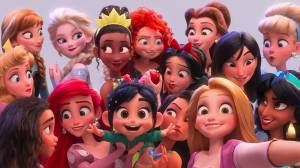 It’s about the forty-five minute mark where the film takes a welcomed turn, where it focuses far more on the character relationships between Ralph and Vanellope, and that’s when the film deepens into something much more special. The antics beforehand were colorful and amusing but too episodic, but once Ralph and Vanellope are split apart, now those same imaginative antics are used in the service of developing characters and exploring their inner conflicts. It’s like the movie went next level with its potential. Vannelope’s excursion into the Disney Corporate Realm leads to fun cameos (Groot), and newly sad cameos (Stan Lee, R.I.P.), but the meta interaction with the Disney princesses is a hoot. The film cleverly ribs the Disney traditions of old but, and this is the key part, finds ways to relate it back to character conflicts and assumptions. The Disney princesses lead Vanellope into a new soul-searching direction, which leads to an inspired musical number that’s filled with silly, ironic non-sequitors and a declaration of purpose, a wonderful melding of the Disney storytelling of old and new. From here, the movie gets better and better as Ralph goes to greater lengths to sabotage Vanellope’s plans to leave him for a new game. The final act grows from this misguided attempt to hold onto selfish needs and rebuke change, and it culminates in a climax that is built around the characters and what they’re willing to give up for one another. For a movie that starts with silly gags about eBay and Twitter, it grows into something that genuinely could bring some tears.
It’s about the forty-five minute mark where the film takes a welcomed turn, where it focuses far more on the character relationships between Ralph and Vanellope, and that’s when the film deepens into something much more special. The antics beforehand were colorful and amusing but too episodic, but once Ralph and Vanellope are split apart, now those same imaginative antics are used in the service of developing characters and exploring their inner conflicts. It’s like the movie went next level with its potential. Vannelope’s excursion into the Disney Corporate Realm leads to fun cameos (Groot), and newly sad cameos (Stan Lee, R.I.P.), but the meta interaction with the Disney princesses is a hoot. The film cleverly ribs the Disney traditions of old but, and this is the key part, finds ways to relate it back to character conflicts and assumptions. The Disney princesses lead Vanellope into a new soul-searching direction, which leads to an inspired musical number that’s filled with silly, ironic non-sequitors and a declaration of purpose, a wonderful melding of the Disney storytelling of old and new. From here, the movie gets better and better as Ralph goes to greater lengths to sabotage Vanellope’s plans to leave him for a new game. The final act grows from this misguided attempt to hold onto selfish needs and rebuke change, and it culminates in a climax that is built around the characters and what they’re willing to give up for one another. For a movie that starts with silly gags about eBay and Twitter, it grows into something that genuinely could bring some tears.
The overall message, that growing apart is okay and can be healthy, that friendships will inevitably change over time and to not stand in the way of change, is a lesson I was not anticipating from a “family film.” I was expecting Ralph Breaks the Internet to mostly cover the dark side of the Internet, in an albeit family-friendly manner, about the casual cruelty and lack of empathy that is magnified from the perceived anonymity. The movie does cover some of this material briefly when Ralph stumbles into a hall of mean-spirited comments (“First rule of the Internet: never read the comments”). I was expecting a more simplified and pat lesson about the evils of the Internet, but instead the filmmakers deliver something far more applicable and important for young people. They could have gone for easy life lessons about online behavior, and instead Ralph Breaks the Internet goes above and beyond to make its message more personal and sympathetic.
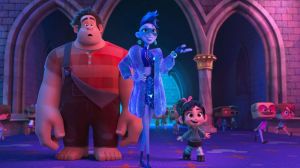 Reilly (Kong: Skull Island) provides a lot of heart to his doofus; enough to keep him grounded even when his character starts making bad decisions to keep the status quo. Silverman (Battle of the Sexes) has a harder time just because she’s asked to keep her voice at a childlike level, which can be grating at certain points. She is still able to convey an array of emotions. The relationship between Ralph and Vanellope is key to the series being more than the sum of its parts, and both actors help this through their sometimes warm, sometimes bickering interactions. The biggest new addition is Gal Gadot (Wonder Woman) as Shank, the leader of a gang of car thieves. She’s a tough lady that takes an immediate shine to the attitude and gusto of Vanellope. The character and her world are more welcomed than Gadot as a vocal actor. She’s fairly limited in range. I did enjoy that they specifically animated Jason Mantzoukas (Netflix’s Big Mouth) as a nerdy question-asker and Oscar-nominee June Squibb (Nebraska) for five seconds each.
Reilly (Kong: Skull Island) provides a lot of heart to his doofus; enough to keep him grounded even when his character starts making bad decisions to keep the status quo. Silverman (Battle of the Sexes) has a harder time just because she’s asked to keep her voice at a childlike level, which can be grating at certain points. She is still able to convey an array of emotions. The relationship between Ralph and Vanellope is key to the series being more than the sum of its parts, and both actors help this through their sometimes warm, sometimes bickering interactions. The biggest new addition is Gal Gadot (Wonder Woman) as Shank, the leader of a gang of car thieves. She’s a tough lady that takes an immediate shine to the attitude and gusto of Vanellope. The character and her world are more welcomed than Gadot as a vocal actor. She’s fairly limited in range. I did enjoy that they specifically animated Jason Mantzoukas (Netflix’s Big Mouth) as a nerdy question-asker and Oscar-nominee June Squibb (Nebraska) for five seconds each.
The Wreck-It Ralph franchise is another stellar plank in a growing armada of Disney animated franchises that could challenge Pixar for supremacy. Walking away from Ralph Breaks the Internet, I had to think it over but I concluded that I was more emotionally fulfilled and pleased than with Pixar’s Incredibles 2. I’m not going to argue that Ralph is the better of the two movies when it comes to storytelling, visual inventiveness, or action, but I was happier and more satisfied leaving Ralph. This is an imaginative, colorful, cheerful, and heartfelt movie with a valuable message and the understanding of narrative structure to see it through. I’m now thinking about a potential third Ralph movie (the director says there won’t be another, but let’s see what Disney says after those box-office grosses come in). We’ve gone to the realm of online gaming, so what’s next? Maybe Ralph’s game gets transferred to a collector’s home out of the country, like in Japan, and then it’s about Japanese gaming culture. Or my pal Ben Bailey suggested Ralph’s game gets relocated into a movie theater, one of the few places arcade machines are still present, and it’s Ralph in the world of the movies. The fact that I’m pitching sequels says something about the franchise’s potential and its accomplishment. Ralph Breaks the Internet is a worthy sequel with of equal parts compassion and wit.
Nate’s Grade: A-
Rango (2011)
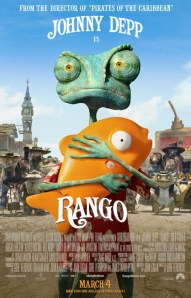 It’s Chinatown remade with anthropomorphic desert creatures. It’s a Western by way of Hunter S. Thompson. It’s a loving parody of cinema’s wide canvas. It’s one of the most wild, anarchic, oddball animated films to ever be released by a major studio, and it is stupendous. Steeped in weirdness and bravado, Rango has a playful and occasionally macabre sense of humor that kept me in stitches. Director Gore Verbinski (the Pirates of the Caribbean flicks) translates his visual verve into a animated movie that dazzles the eyes with its magnificently drawn features as well as the pointed personality in every stroke. This is a movie with character, not to mention some pretty entertaining characters (including talking road kill). Johnny Depp delivers an idiosyncratic vocal performance for a household lizard that finds himself pretending to play sheriff for a town in need of a hero. When you think Rango will fade into familiar territory, or easy moral messages, the film keeps surprising, forging its own unique path. This is a lively, peculiar, and overall enchanting animated film that’s suitable for families but may well play better for adults with eccentric tastes. I’m still scratching my head, and celebrating, how something like this slipped through the system.
It’s Chinatown remade with anthropomorphic desert creatures. It’s a Western by way of Hunter S. Thompson. It’s a loving parody of cinema’s wide canvas. It’s one of the most wild, anarchic, oddball animated films to ever be released by a major studio, and it is stupendous. Steeped in weirdness and bravado, Rango has a playful and occasionally macabre sense of humor that kept me in stitches. Director Gore Verbinski (the Pirates of the Caribbean flicks) translates his visual verve into a animated movie that dazzles the eyes with its magnificently drawn features as well as the pointed personality in every stroke. This is a movie with character, not to mention some pretty entertaining characters (including talking road kill). Johnny Depp delivers an idiosyncratic vocal performance for a household lizard that finds himself pretending to play sheriff for a town in need of a hero. When you think Rango will fade into familiar territory, or easy moral messages, the film keeps surprising, forging its own unique path. This is a lively, peculiar, and overall enchanting animated film that’s suitable for families but may well play better for adults with eccentric tastes. I’m still scratching my head, and celebrating, how something like this slipped through the system.
Nate’s Grade: A
An Education (2009)
 In 1961 Britain, Jenny (Carey Mulligan) is a 16-year-old schoolgirl plowing away at her education. She?s on track to enroll at Oxford “reading English” and her parents (Alfred Molina, Cara Seymour) have overscheduled the girl with hobbies and clubs to help build her academic portfolio. Then one rainy night she meets David (Peter Sarsgaard), a thirty something man who offers to give her and her cello a ride. This enchanting man keeps coming back around to see Jenny, sweeping her off her feet. He invites her to go to concert recitals with his older friends Danny (Dominic Cooper) and Helen (Rosamund Pike), trips to the country, and even a fabulous getaway to Paris. “You have no idea how boring my life was before you,” she confesses to David. But David is coy about how he can pay for such extravagances. Jenny’s grades begin to suffer and it looks like she may miss out on being able to enroll at Oxford. She has to make a decision whether to continue seeing David or going back to her primary school education.
In 1961 Britain, Jenny (Carey Mulligan) is a 16-year-old schoolgirl plowing away at her education. She?s on track to enroll at Oxford “reading English” and her parents (Alfred Molina, Cara Seymour) have overscheduled the girl with hobbies and clubs to help build her academic portfolio. Then one rainy night she meets David (Peter Sarsgaard), a thirty something man who offers to give her and her cello a ride. This enchanting man keeps coming back around to see Jenny, sweeping her off her feet. He invites her to go to concert recitals with his older friends Danny (Dominic Cooper) and Helen (Rosamund Pike), trips to the country, and even a fabulous getaway to Paris. “You have no idea how boring my life was before you,” she confesses to David. But David is coy about how he can pay for such extravagances. Jenny’s grades begin to suffer and it looks like she may miss out on being able to enroll at Oxford. She has to make a decision whether to continue seeing David or going back to her primary school education.
An Education is a handsomely recreated period drama that manages to be very funny, very engaging, and very well acted. It’s also rather insightful and does an exquisite job of conveying that strange wonderful heartsick of love, maybe better than any movie since My Summer of Love. You can practically just drink in all of Jenny’s excitement. Jenny isn’t a silly girl prone to naivety. She’s a smart and clever girl, and not just because other characters say so or we see her stellar test grades destined for prime placement on the fridge. You witness her intelligence in how she interacts through different social circles. Since the movie is entirely Jenny?s story, we need to be convinced that she’s smart in order to believe her willingness to be duped. She has reservations about David’s habits but doesn’t want to risk going back to a dull life of books and family dinners. She has to be a smart, vibrant girl anxious to keep a good thing going, willing to ignore certain warning signs that otherwise might cause her pause. Even Jenny’s parents get caught up in the seduction, swooning over David and his upper class connections and comforts.
 The teen-girl-with-older-male aspect might make us squirm, but in the realm of 1961 Britain, it’s acceptable. Jenny and David don?t need to hide their affair in dank hotel rooms and avoid any suspicious eyes. We don’t get any agonizing inner turmoil over dating a teenage girl, mostly because it’s from Jenny’s perspective and that everybody else seems okay with it all. This acceptance means that the drama for An Education can focus on something less seamy. That doesn’t mean that everybody approves. While Jenny’s friends think she hit the jackpot, and hang from her every word about her amazing sophisticated boyfriend, her literature teacher (Olivia Williams) sees through David?s whirlwind of charms. This isn’t the tale of some girl being drawn into the dark side, turning into an unsavory, rebellious teenager flouting the law and good manners. Jenny is not that kind of gal.
The teen-girl-with-older-male aspect might make us squirm, but in the realm of 1961 Britain, it’s acceptable. Jenny and David don?t need to hide their affair in dank hotel rooms and avoid any suspicious eyes. We don’t get any agonizing inner turmoil over dating a teenage girl, mostly because it’s from Jenny’s perspective and that everybody else seems okay with it all. This acceptance means that the drama for An Education can focus on something less seamy. That doesn’t mean that everybody approves. While Jenny’s friends think she hit the jackpot, and hang from her every word about her amazing sophisticated boyfriend, her literature teacher (Olivia Williams) sees through David?s whirlwind of charms. This isn’t the tale of some girl being drawn into the dark side, turning into an unsavory, rebellious teenager flouting the law and good manners. Jenny is not that kind of gal.
Mulligan is fantastic and delivers such a sumptuous performance that you feel like a human being is coming alive before your eyes. She lights up with the dawning realization that a charming and worldly man is courting her, and you feel every moments of her swirling delight and awe. Mulligan even goes so far as to get even the small details right, like the way Jenny opens her eyes to peak during a kiss to make sure it’s all not just some passing dream, or the way she has to look away at times and break eye-contact because she’s just so happy, with those twinkling eyes and a mouth curling like a cherry stem. She’s bashfully coquettish in her physical attraction to David, though in my praise it also sounds like I, too, have fallen for the girl. Much ink has been spilled declaring Mulligan as a rising Audrey Hepburn figure, mostly because she sports that famous short bob of a haircut that many girls had in 1961. To me, Mulligan gives a stronger impression as being the luminescent little sister to Emily Mortimer (Lovely & Amazing, Match Point). Mulligan is a fresh young actress that delivers a performance of stirring vulnerability. It’s a breakout performance that will likely mean that Hollywood will come calling when they need the worrisome girlfriend role for the next factory-produced mass-market entertainment (she’s finished filming the Wall Street sequel, so perhaps we’re already there).
 Adapted by Nick Hornby (About a Boy) from a memoir by Lynn Barber, An Education follows the coming-of-age track well with enough swipes at class-consciousness. But man, I was really surprised how funny this movie is. An Education is routinely crackling with a fine comic wit, and Jenny and her father have the best repartee. Molina is an unsung actor and he dutifully carries out the role of “uptight neurotic father” with more than a stiff upper lip; the man puts his all in the role. While he can come across as hysterical at times, Molina is paternal with a capital P. It’s refreshing just to listen to smart people banter at an intelligent level.
Adapted by Nick Hornby (About a Boy) from a memoir by Lynn Barber, An Education follows the coming-of-age track well with enough swipes at class-consciousness. But man, I was really surprised how funny this movie is. An Education is routinely crackling with a fine comic wit, and Jenny and her father have the best repartee. Molina is an unsung actor and he dutifully carries out the role of “uptight neurotic father” with more than a stiff upper lip; the man puts his all in the role. While he can come across as hysterical at times, Molina is paternal with a capital P. It’s refreshing just to listen to smart people banter at an intelligent level.
The movie’s theme ponders the significance of education. There’s the broader view of education, learning throughout one’s life from new and enriching experiences. She gets to learn a bit more of the way of the world, and Jenny feels that she can learn more and have fun with David than sitting through lectures and slogging through homework. She values what David has to teach her above what she can find in a textbook. Jenny’s father stresses the virtues of learning and thinking but once Jenny has a chance to marry an upper class, cultured male then education no longer matters. She is now set for life through David. All that learning to become a dutiful housewife in a lovely, gilded cage. Is that the real desired end to personal growth: to snag a husband? The school’s headmistress (Emma Thompson in practically a cameo) doesn’t serve as a great ambassador to higher learning: she stresses the lonely hardships, internal dedication, and she herself is openly anti-Semitic, proving that an intelligent mind is not the same as being open-minded. To her, Jenny is jeopardizing her lone chance at a respectable life.
 Jenny rejects the traditional route of education and chooses to pursue a life with David, that is, until the third act complications beckon. Jenny finds out about David’s secret rather too easily, I’m afraid (secret letters should never be hidden the glove compartment). While the end revelations are somewhat expected, what is unexpected is that every character pretty much escapes consequences by the end of the film. No one is really held accountable for his or her decisions. Pretty much everyone is exactly where he or she left off just with a tad more street smarts. It’s the equivalent of learning not to trust every person after getting ripped off.
Jenny rejects the traditional route of education and chooses to pursue a life with David, that is, until the third act complications beckon. Jenny finds out about David’s secret rather too easily, I’m afraid (secret letters should never be hidden the glove compartment). While the end revelations are somewhat expected, what is unexpected is that every character pretty much escapes consequences by the end of the film. No one is really held accountable for his or her decisions. Pretty much everyone is exactly where he or she left off just with a tad more street smarts. It’s the equivalent of learning not to trust every person after getting ripped off.
Despite all the hesitation, and the age difference, An Education is an actual romantic movie. It’s a coming-of-age charmer with all the preen and gloss of an awards caliber film. You feel the delight in the sheer possibility of life for Jenny. The story unfolds at a deliberate pace and allows the audience to feel every point of anxiety and bubbling excitement for Jenny. Mulligan gives a star-making performance and practically glows with happiness during the movie’s key moments, making us love her even more. The plot may be conventional but the movie manages to be charming without much in the way of surprises. Still, An Education is a breezy, elegant, and clever movie that flies by, even if its biggest point of learning is that age-old chestnut that something too good to be true must be.
Nate’s Grade: A-
Spider-Man 2 (2004)
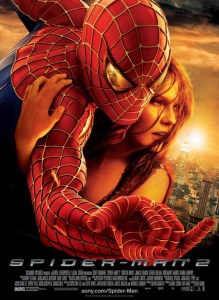 No other movie had higher expectations than Spider-Man 2 and no other movie met and trounced those expectations than director Sam Raimi’s high-flying webslinging sequel. Spider-Man 2 was that rare sequel that excelled in near every way. The action sequences were lively and highly exciting, but what made Spider-Man 2 so thrilling was its success in building strong emotional characters. After all, how many superhero films are written by the writer of Ordinary People? (One wonders what he would have done with Catwoman) Alfred Molina, as Doc Ock, made for a great formidable foe and brought surprising humanity to the dastardly part. Spider-Man 2 was a momentous crowd-pleaser that also dazzled the hardest critics. It reaffirmed exactly what a summer popcorn film can make us feel.
No other movie had higher expectations than Spider-Man 2 and no other movie met and trounced those expectations than director Sam Raimi’s high-flying webslinging sequel. Spider-Man 2 was that rare sequel that excelled in near every way. The action sequences were lively and highly exciting, but what made Spider-Man 2 so thrilling was its success in building strong emotional characters. After all, how many superhero films are written by the writer of Ordinary People? (One wonders what he would have done with Catwoman) Alfred Molina, as Doc Ock, made for a great formidable foe and brought surprising humanity to the dastardly part. Spider-Man 2 was a momentous crowd-pleaser that also dazzled the hardest critics. It reaffirmed exactly what a summer popcorn film can make us feel.
Nate’s Grade: A
Luther (2003)
 Certain things can pass under my radar. Previously it’s been items like female flirtation and the due dates of papers. So imagine my befuddled surprise when last weekend my father, himself a Lutheran minister, said the family was going to hop on over to the movie theater and catch a historic bio-flick about Martin Luther, plainly titled Luther. I had no idea this movie existed. And after seeing it, it left no strong memory that it did.
Certain things can pass under my radar. Previously it’s been items like female flirtation and the due dates of papers. So imagine my befuddled surprise when last weekend my father, himself a Lutheran minister, said the family was going to hop on over to the movie theater and catch a historic bio-flick about Martin Luther, plainly titled Luther. I had no idea this movie existed. And after seeing it, it left no strong memory that it did.
Luther (Joseph Fiennes, Shakespeare in Love) is a 16th century German monk with some quibbles with the Catholic Church. Seems Luther doesn’t like how the Church is preying upon people’s faith for money, most notably its chief indulgence seller Johann Tetzel (Alfred Molina, with a criminally scant appearance). He makes up a list of 95 grievances, nails them to the doors of a church, and thus Protestantism is born. Luther’s ideas catch on wit the lower classes through rampant publication, thanks to the newfound printing press. The princes of the German states also like what this monk is cooking, and they decide to hold him in safety. The Catholic Church, however, is none too pleased. They threaten excommunication and eventually death, and keep pushing for Luther to recant. But Luther feels he must stand strong in his convictions.
The acting is fine, and the direction is passable, but the pacing of Luther is like tracking the movement of a glacier. Some representative decisions are also fairly stupid. To try and communicate Luthers internal struggle he hits his head and yells like at voices. The first time it’s funny. The next five times, it’s dumb. There’s also a dirty peasant child who’s crippled but still a big fan of the Luther Man. Her gaping tooth smile has more screen time than some characters. Later in the film the peasant revolts ravage through the country with thousands massacred. Luther visits the ruins and comes across the little girl’s broken crutch and breaks down and cries. If you were in my theater you probably heard me hitting my forehead repeatedly (no voices though).
The film is an admirable effort, but Luther ultimately fails because of the measures of film. To try and tell the story of Luther would be more appropriate for the confines of a miniseries, not a two-hour movie. The Reformation and its players lose its impact in such a shrift retelling. What the audience gets is a pared Cliff notes version that misses the richness, and gives lip service to the historical importance. What were left with are endless scenes where people dress up and talk and talk and talk. Without a sense of weight for character or story, the countless talky moments blur into tedium. If I had a sleeping bag with me I would have curled up into it.
Another problem is the lack of makeup. The film spans thirty-some years and yet Fiennes doesn’t age a day. My mother proposed that maybe he didn’t want to look old and decrepit in the film. I responded by saying, He let them shave his head but he didn’t want anybody to splash some gray in his hair?
I guess if you judge movies on costumes or production values, Luther would be competent. But does anyone go to a film saying, ”Man, I sure hope those costumes and sets are incredible! Fingers crossed!?” Luther is a well-meaning bore that only historical enthusiasts and Lutherans might enjoy.
Nate’s Grade: C



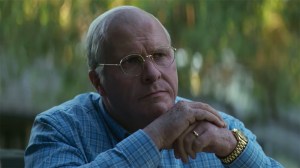




You must be logged in to post a comment.